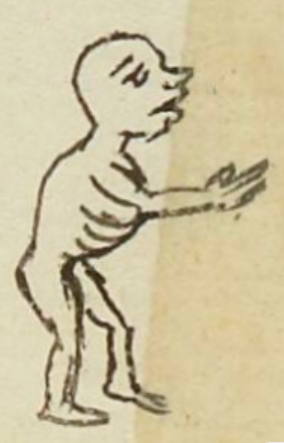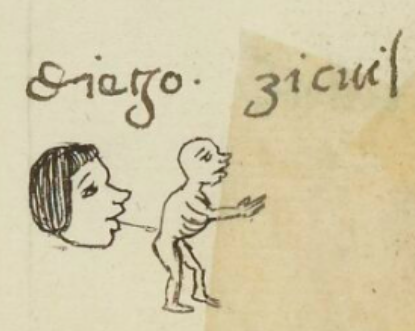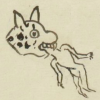Tzicuil (MH536r)
This black-line drawing of the simplex glyph for the personal name Tzicuil ("Thin Bodied,” or Cicuil, "Ribs," attested here as a man’s name) shows a small naked body in profile, looking toward the viewer's right. His visible eye is open, his mouth is open, and his arms are reaching forward. He has no hair on his head, and he is not clothed. His ribs are pronounced. His expression is somewhat forlorn. His posture seems to be supplicative, or one who is humbly entreating.
Stephanie Wood
Terms for ribs and becoming thin can start with ci- or tzi- apparently. Regardless of the spelling, a semantic and homophonic relationship seems clear. It is also worth noting that there was a revered Tzicuiltzin that perhaps this person was named after. She was a daughter (and the first child) of Quinatzin. She was also the mother of don Francisco Carlos Xoconochtzin. (See: History and Mythology of the Aztecs: The Codex Chimalpopoca, 1998, 50.) Her existence is the reason for the choice of Tzicuil here over Cicuil.
Stephanie Wood
diego. zicuil
Diego Tzicuil
Stephanie Wood
1560
Jeff Haskett-Wood
skinny, flaco, bones, huesos, ribs, costillas, nude, nudity, desnudez, nombres de hombres

tzicuilihui, to become thin, https://nahuatl.wired-humanities.org/content/tzicuilihui
cicuil(li), ribs, https://nahuatl.wired-humanities.org/content/cicuilli
omicicuil(li), ribs, https://nahuatl.wired-humanities.org/content/omicicuilli
Costillas
Stephanie Wood
Matrícula de Huexotzinco, folio 536r, https://www.loc.gov/resource/gdcwdl.wdl_15282/?sp=151&st=image
This manuscript is hosted by the Library of Congress and the World Digital Library; used here with the Creative Commons, “Attribution-NonCommercial-ShareAlike 3.0 License” (CC-BY-NC-SAq 3.0).










